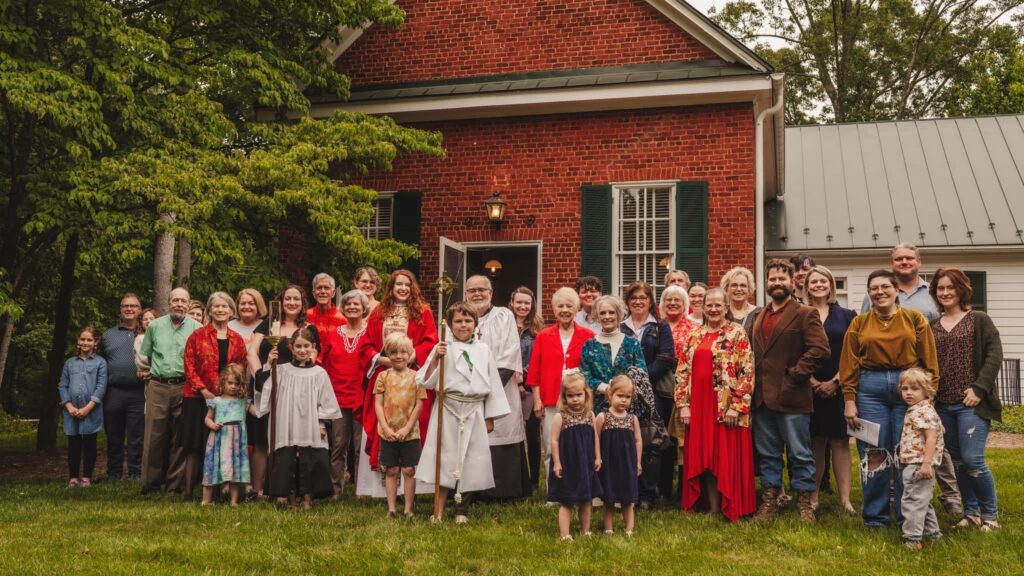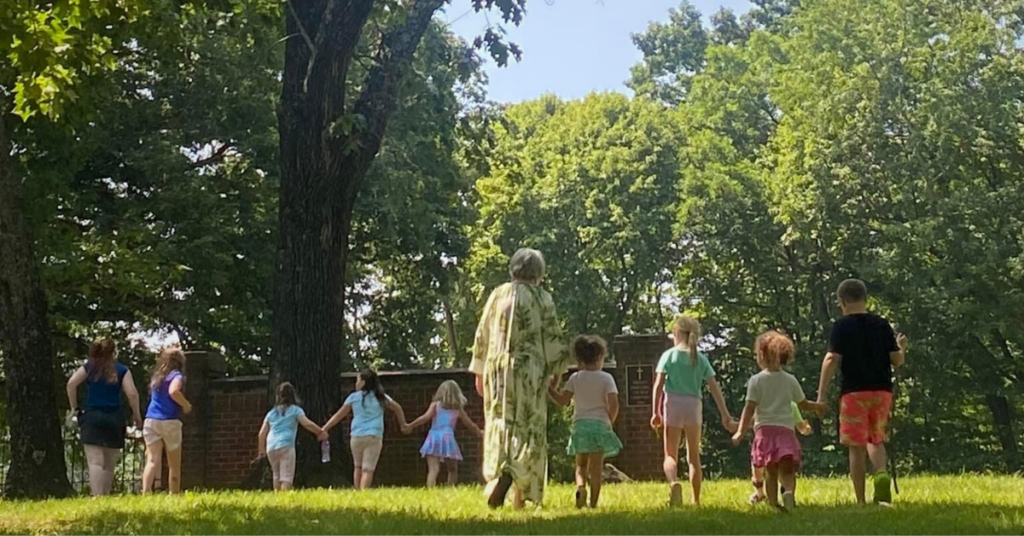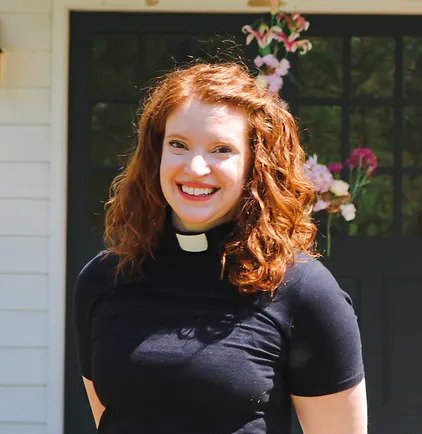Trinity Episcopal Church is about to celebrate 200 years of ministry; I’m about to reach 3 years as the church’s rector and priest. On the faithful innovation spectrum, we’re an established church growing missional.
Trinity began as a chapel served by circuit-riding priests in the early 1800s, and this history sets us up for mixed ecology ministry: between the services led by priests, the members kept the heartbeat of ministry and worship going. The church grew into a more traditional expression over the years. Trinity is a family-sized parish, verging on pastoral-sized; during their search for a new priest in the fall of 2020, the search committee thought carefully about what changes they would need for the future.
I’ve been here almost three years and as I have gotten to know the long-term church community and seen how we have listened to our community, we’ve grown younger and rooted deeper—we’ve seen startling change and the constancy of God’s faithfulness.
God has given the growth for:
- the number of generous people giving to the church
- our membership
- number of visitors
- public presence
I see the potential for us to build practices that are inspired by the best of our creative and practical origins and leverage the establishment era church practices of the 20th century to support a mixed ecology of ministry.
In trying to find our way there, I’ll describe a few different change factors we’re seeing and describe three different unifying practices.
Growing with the regional city
My wife and I moved here in January 2021 and met a lot of people who had recently moved here for jobs in healthcare and education, for a lower cost of living, and to live near the mountains.

Lynchburg has a growing creative community. According to recent census data, our median age here is 28.5 years old. We’ve loved getting to know long-timers in this community—-they tell us they feel a new energy in the area. Long-term residents are grateful to see community organizing movements around reproductive justice and health access, Hill City Pride, and racial justice.
People looking for a new church in our area have many to choose from—but the list of affirming churches is shorter, and the list of churches with LGBTQ+ people in both ordained and lay leadership is smaller still. In the spring and summer of 2021, we welcomed a stunning number of visitors; most stayed.
One easy technical change was switching our logo and branding from Trinity Episcopal Church in Boonsboro to Trinity Episcopal Church in Lynchburg. We’re just at the county line. Boonsboro is the name of the neighborhood/region, and the local country club, and for a while church membership drew heavily from this area. Yet we were finding that more people drive 15+ minutes to get to us, and while Boonsboro is known for beautiful views of the mountains and in-demand real estate, to others, the name invoked snobbishness, unaffordability, and for people of color, the feeling they are more likely to get pulled over. Please picture my face when I went to the local post office and walking through the attached stationery store, saw napkins with the Boonsboro zip code embossed in gold. For those for whom Boonsboro is a neutral or positive signifier? We’re still here.
By pitching our identity, mission, and community accountability broader, this technical change supported an adaptive change: we have more working people than retirees, more representation of different socio-economic realities, and no one common schedule pattern: gig economy, self-employed, remote work, offset schedule, weekend and night shifts; also theoretically retired grandparents doing a significant amount of family care or childcare.
I applied to the SEEDS project knowing innovative and entrepreneurial ministry practices, supported in community, would help me fill in my gaps. The exercise described below has us at Step 1 of Faithful Innovation: Listen, Reconnect, Define, Reframe, Cultivate—and sets us up for…
Sunday morning at the changing church
50-70% of our Sunday morning worshiping congregation is new since 2021. Most members did not grow up in the Episcopal Church—this gives longer-term members more of a chance to tell their story of faith and what they’ve found here, and to hear why someone would be curious about Trinity; this gives newer members a space that is eager to listen to, learn from, and show Jesus’ love to them—as well as the sense that they aren’t the only learning a new language of prayer and community.

We really value being a multi-generational parish—children’s ministry has gone from 2 to 17 participants and their families. Folks in their 20s-40s are friends with each other—and people their parents’ age. Hearing people see, appreciate, and compliment each other’s spiritual gifts is beautiful to overhear and I’m grateful for the way it knits people together.
We’ve enjoyed exploring new spaces together:
- a monthly kids + families communion service
- Children’s Chapel that is flexible and a low-lift in volunteer planning
- Prayer Retreat with yoga (the age range at this was 9 to 60!)
- Compassion Camp instead of VBS
- Queer Theology book group.
I think we are all so used to age-sorted spaces that this aspect of church community is refreshing. Somebody remarked that knowing people will all be in one place without a group text is crucial.
Post 2020, I’m not seeing decline, I’m seeing differentiation into a few different patterns of attendance and participation: every Sunday, most Sundays, irregular but enthusiastic, and finally open-hearted visitors. This does mean two people can be members of the church and almost never see each other, this does mean our Sunday attendance number is a smaller rotating slice of our total involvement number.
Church growth has looked like replacement for attrition, according to the numbers, but has meant a broader group of people see Trinity as a place to grow in the knowledge and love of God.
The linear parish growth model makes assumptions Trinity can’t make: in most Episcopal parishes, many have the people resource of retirees with free time. Trinity has the busiest people in this age bracket that I’ve ever met: full-time grandparents, the quasi-retired, the still working. I’ve seen this imbalance as unfair and burnout for a long time—so having it off the table is kind of nice. The linear growth model also presumes that people have a few strong affiliations and commitments instead of the many overlapping and competing pulls that modern life can generate.
This gives us the gift of refining our volunteer asks; if we are inviting you into a ministry, we want to be thoughtful about what is spiritually nourishing to you, what is manageable, what fits within your other commitments. I want everyone seeking to have the comfort of embodied community and the presence of God in the sacrament of communion, and words of Jesus’ grace spoken over them, and I trust their discernment for when and how often.
What’s next?
Knowing the verse in Proverbs that without a vision, the people perish, knowing that the church needs new models to prepare for the future, how do we hear that in a locally authentic way?
It feels like Trinity has been a different church every 6 months of the past 2.5 years—our capacity seems to grow exponentially with each 5 people who join; if the traditional linear growth model doesn’t describe how we are growing, if replicating the programming of a church the next size up doesn’t match our call to more specific ministries and our broad accountability, how do we hear God’s vision over traditional organizational practices, God’s purposes for us over the comparing ourselves to other churches?

Blue Sky Day
I saw the concept in a self-help article first; it also borrows from a concept in research and strategic planning, a way to train the mind and the patterns of collective discernment to think in terms of God’s abundance—to break through the “going back to Egypt” mentality, break through the scarcity mindset, break the idol of the practical and the possible to hear what God can make possible.
So one coffee hour we asked everyone this question:
What would we do for our church, community, city, and world—if we had nothing in our way, if we trusted that God would send the resources we needed it to make it happen?
I added this note: This form is anonymous—but all responses will be used in further conversations. If responses are sensitive/vulnerable, they will not be linked back to you, but are important for our reflection. Write whatever comes to mind, sign it if you like!
We set out both big sheets of paper so people could write responses down together, and small slips of paper in case people wanted more privacy.
The responses astounded me, here’s a sample:
Mission
- Violence crisis response team: if people in our area are victims of violence, we respond to them with a team to pray/love/provide/support
- Provide shelter for homeless
- Feed hungry people
- House youth in need
- Manage and operate one large program like meals on wheels
Connection
- Hug people that are sad and need a hug
- A directory of those willing to be called/texted/emailed as a listening ear or prayer pal
- Create more safe/soft spaces for LGBTQ community both in general and to worship God
- Heal church hurt
Some of these I never saw coming; others I’ve thought would be great for us to do, but I didn’t want it to come top down; this threw an end-run pass around some stasis and it is a great jumpstart for a vision team. The big response to grassroots vision has been so encouraging for how we are hearing God here—and the Faithful Innovation Leader Companion has been instrumental in helping me plan the next steps to steward the beauty of this creativity.
I love this church; it makes me love them more to read about how they see our shared call, our shared spiritual gifts, their confidence in how God has brought them together.



